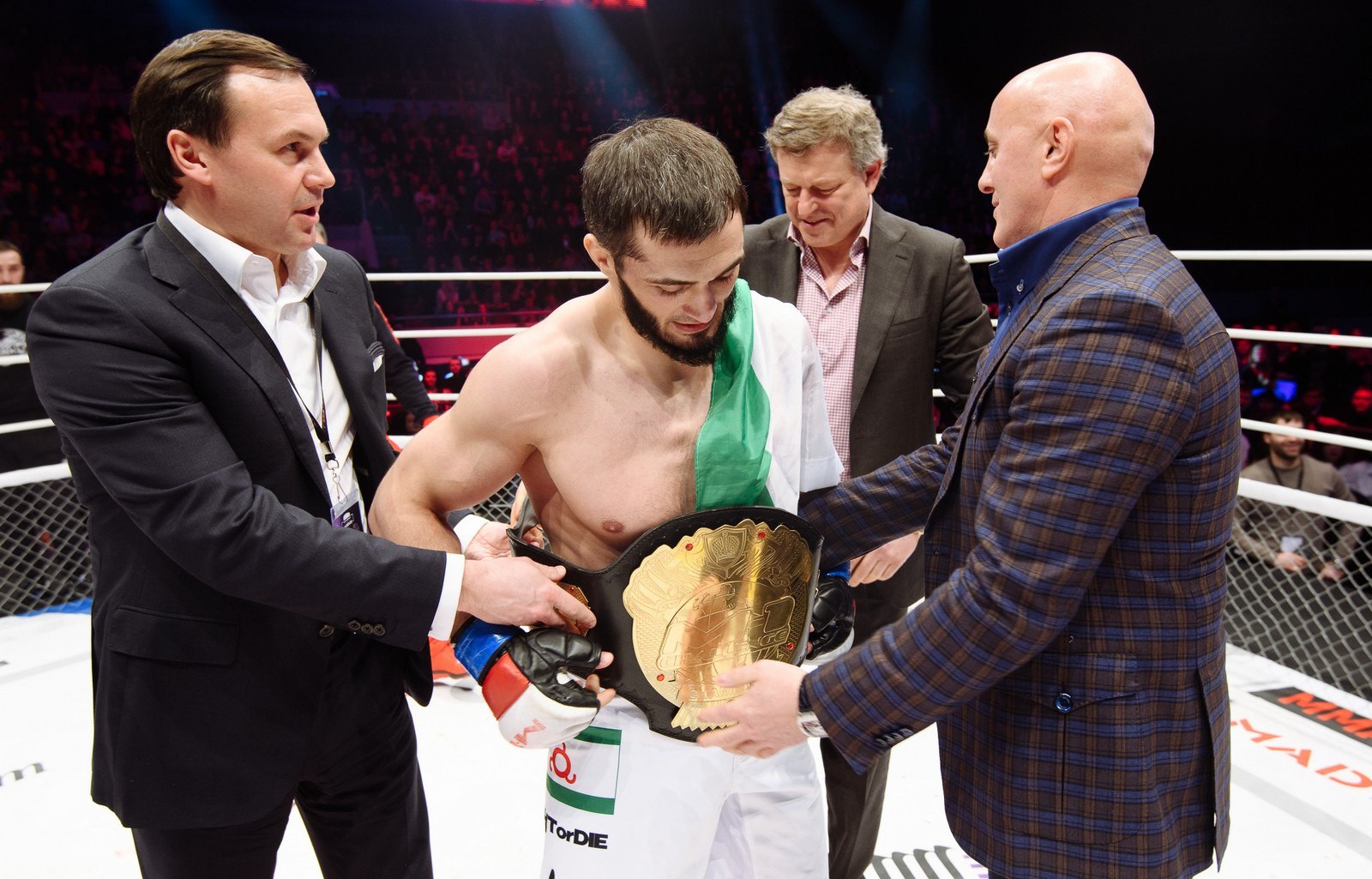
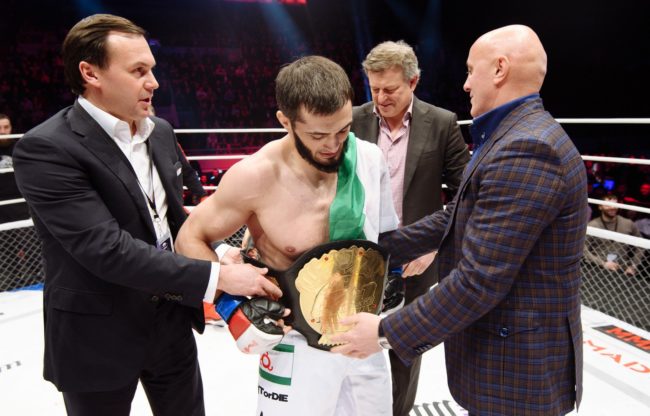
 Ingushetia remains one of Russia’s most troubled and impoverished republics, one rattled by Islamic insurgency, corruption, and a sluggish economy. However, with the president’s indirect use of mixed martial arts to enhance his republic’s image, two brothers have emerged to spearhead the movement for the betterment of Ingush society.
Ingushetia remains one of Russia’s most troubled and impoverished republics, one rattled by Islamic insurgency, corruption, and a sluggish economy. However, with the president’s indirect use of mixed martial arts to enhance his republic’s image, two brothers have emerged to spearhead the movement for the betterment of Ingush society.
It was 1998 when Abukar, age 10, and Adam, age 9, stepped into an eight-sided cage for their first ‘mixed rules’ fights.
Dressed in head gear, gloves, and wrestling shoes, the prepubescent brothers thrived at an event where the average age was 15. They punched and kicked with cat-like agility and ragdolled unsuspecting opposition using basic hip tosses and Kodokan judo throws — moves etched into their muscle memory from years of drilling under the tutelage of their champion father, Alikhan Yandiyev. He had morphed them into confident young judokas, and shaped their cultural identity as Ingush men.
Footage of the 1998 tournament has since been made available online. Every viewing brings back waves of emotions for the brothers. In the 18 years that followed, they went on to become successful mixed martial arts (MMA) fighters and popular athletes representing Ingushetia, a lesser-known and impoverished republic in the North Caucasus.
Ahead of Adam’s final fight before an injury-related retirement in 2015, I spent a few hours with the brothers in Sochi, where they recalled their pre-teen MMA fight as a defining factor in their Ingush upbringing. ‘My father raised us in a manner where no one should ever insult us’, said Adam. ‘This is not just about our upbringing but a part of Ingush culture as well’, he continued.
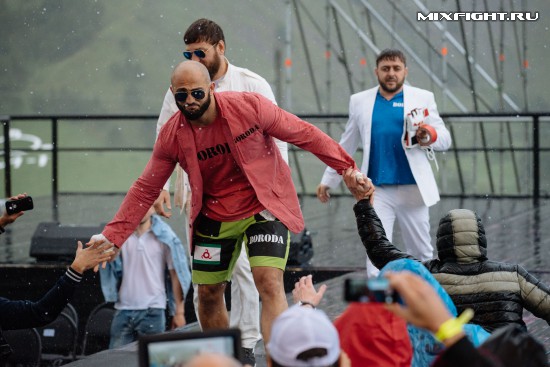
A region rife with corruption, destabilisation, and fundamentalist insurgency
Born in the Republic of Ingushetia, the smallest of the 21 republics in the Russian Federation, the Yandiyev brothers grew up in a rural and mountainous region rich in tradition and ancestral history. Though Ingushetia was only separated from neighbouring (and ethnically similar) Chechnya in 1992 following the collapse of the Soviet Union, it maintained a strong indigenous identity of people of Vainakh ancestry. Cursed with poor geopolitical positioning, Ingushetia has gone through periods of war and ethnic cleansing that have tormented the nearly 500,000-large population. What began as mistreatment under Stalin’s rule helped shape one of Russia’s poorest republics; a region rife with corruption, destabilisation, and fundamentalist insurgency.
[Read on OC Media: After 73 years, the memory of Stalin’s deportation of Chechens and Ingush still haunts the survivors]
Yet despite decades of conflict and deteriorating human rights in the region, Ingush traditions and culture have survived, if only in idealised or deteriorated forms. Centuries of Russian oppression over the North Caucasus has led some Ingush people to try to cling to certain controversial traditions, in an attempt to reestablish their culture. This has taken the form of customs such as bridal kidnappings and a patriarchal education that places emphasis on hard labour, sports, and eventually military service for young boys.
Alikhan, a master of sports in judo, placed his sons in judo competitions from a young age. The two brothers quickly gained a reputation as talented fighters, which brought them some unwanted attention during their school days.
‘We beat him up together’
With a broad smile etched across his face, Adam fondly recalled memories of getting into fights to ‘protect girls in the neighbourhood’ from other men. According to Abukar, their first serious fight took place when they were aged 12 and 13 respectively, against a ‘big guy who insulted us because of our Ingush background’. Racism against natives of the North Caucasus is widespread in Russia, and the brothers’ response was swift: ‘I grabbed his legs and Adam attacked the upper half of his body and we beat him up together’. When they arrived home that evening with torn clothes and bruises, their father beamed with pride. He had taught them well.
Unlike the vast majority of Ingush citizens, Alikhan is also a wealthy businessman. The 53-year-old served as Ingushetia’s Deputy Minister of Construction, before being promoted to Director of Economics and Investment Programmes. Following his tenure in government, Alikhan founded his own construction company, which has been awarded a large number of government construction projects. However, it is unclear where Alikhan’s significant wealth emerged from in the republic where corrupt schemes are not uncommon in the construction sector.
And yet despite his affluence, in deep contrast to the economic standing of his native republic, the two brothers insist that nothing came easy for them.
‘We have a tradition that we can’t ask our father to give us anything’, said Adam. ‘Even though he is a wealthy man, we had to work hard and earn everything. Nothing was given for free.’
This understanding between the father and his two sons extended well into adulthood. Even when Abukar got married, fathered three children, and worked on the security detail of the Ingush president, he still had to ask permission from his father to participate in professional MMA: ‘My first serious request from him was in 2014, when I wanted to become a fighter’.
Though reluctant to allow his son to follow a less traditional career path, Alikhan agreed. His decision forever changed his family’s future.
Socialisation through sport
Every summer, Ingushetia is treated to a pair of high quality MMA events usually reserved for better known regions of Russia. What began as a promotional experiment has turned into an annual partnership between M-1 Global, one of the biggest MMA promotions in the Russian Federation, and Ingush President Yunus-Bek Yevkurov. The Yandiyev family was instrumental in this process, and pivotal to its eventual success.
‘This event was to boost the development of the tourism industry’, Yevkurov said in a prepared statement during the 2016 edition of the ‘M-1: Battle of the Mountains’ event. ‘We want to present Ingushetia as a safe and peaceful republic, where one can hold such large-scale events. We wanted to show the traditions and culture of our people and the beauty of our beloved country. I think that we have succeeded’, he continued.
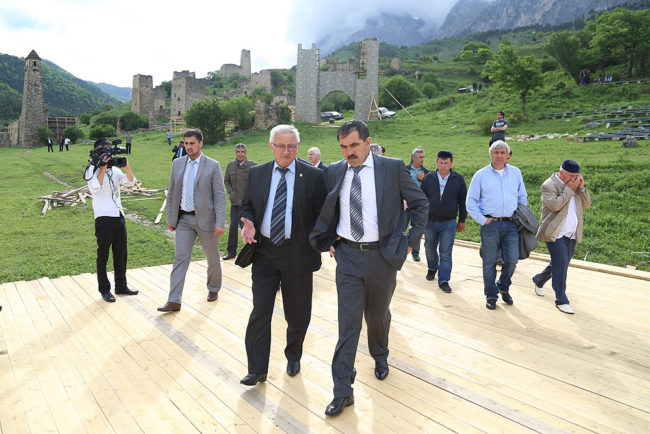
Yevkurov was appointed third President of Ingushetia by the Kremlin in October 2008. At the time, the southern Russian republic was subject to regular attacks from Islamic militants, and political violence between various clans. Yevkurov’s predecessor, Murat Zyazikov, was accused of widespread corruption and had proven incapable of dealing with the growing wave of insurgency within the republic. Yevkurov, selected because of his limited experience in political office, cracked down on corruption within his government and attempted to negotiate with the Islamists. Though an attempt on his life was made in 2009, Yevkurov has managed to dramatically decrease the number of attacks and the overall level of violence in the republic.
[Read also: Ingushetia to socialise families of fallen militants and law enforcement officers]
Yet despite Yevkurov’s efforts, militants remain a visible threat. Therefore, to supplement his military and administrative response, Yevkurov has attempted to divert Ingush youth away from a potential life of insurgency and towards sports and the disciplined lifestyle that accompanies them. Though not necessarily a product of the president’s state-funded sports plans, the Yandiyev brothers still happened to be the most popular Ingush athletes of his tenure, and therefore were regularly seen with Yevkurov.
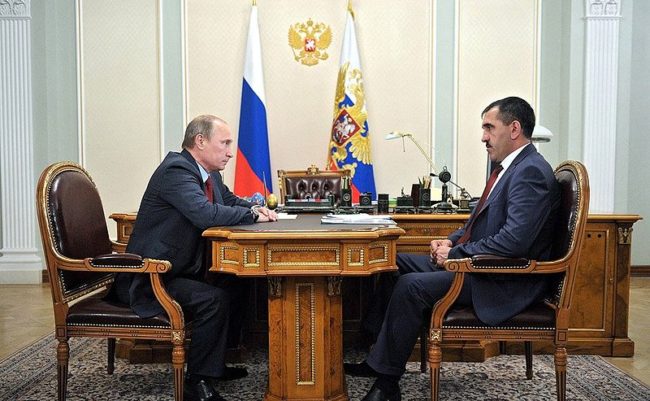
With the sport’s rising popularity in Ingushetia as a result of the Yandiyev brothers’ popularity, their previously-tentative father, Alikhan, invested in M-1 Global in 2015, and became a shareholder for Russia’s oldest MMA promotion. This helped ensure that the promotion would make more than one annual stop in Ingushetia. Over the following two years, some of Russia’s most renowned fighters competed in cities like Nazran and Magas, and were showered with gifts from Yevkurov — a high-visibility move that presented Ingushetia as a rich republic with a generous leader.
Much like Yevkurov’s strategic gift-giving, other aspects of the Ingush leader’s plan for sports socialisation thrive on the illusion of a peaceful and flourishing republic. The MMA events hosted deep in the mountains give the impression of safety, while local stars like the Yandiyev brothers help cultivate Ingush nationalism by representing their republic. Seemingly unwittingly, the brothers have become tools in Yevkurov’s political theatrics.
Asserting Ingush identity
The Yandiyevs are physical specimen. Both Abukar and Adam were gifted with muscular frames generally reserved for bodybuilders and pro wrestlers. Coupled with their talent for the grappling arts, the two brothers quickly garnered attention within the Russian MMA scene. Adam compiled a 9–0 record as a light-heavyweight between 2014–2015, before retiring with a serious back injury, while Abukar is 9–1 and a reigning M-1 Global lightweight champion. As the only active fighter remaining in the family, Abukar has his sights set on the UFC, by far the biggest MMA promotion in the world, if only to showcase their Ingush culture on an international stage.
To reconnect with his origins, Abukar wears a papakha, the traditional North Caucasus woolen hat that encapsulates the heritage of the region’s mountaineers, into the ring. His fight entrances contain dakhchan-pandar music, the plucked string sound of his childhood. His t-shirt, usually reserved for sponsorships, has the Ingush flag emblazoned across the chest. As Abukar explained, everything done in their fights, from the show to the presentation, is all connected to their personal understanding of Ingush tradition.
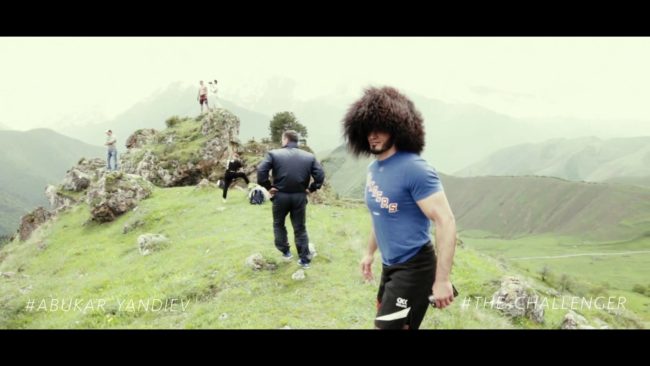
This surprising self-awareness and cultural identity is reflected in Abukar’s personality as a fighter. He explained that Ingush culture is rooted in a ‘strong tradition of respect’: ‘This applies in sports and to our opponents. Whether you win or lose, you have to maintain this respect.’ So as the M-1 Challenge events continued to grow in Ingushetia, so did Yandiyev’s popularity as a true Ingush sportsman. This eventually caught the attention of controversial political figures like Ramzan Kadyrov, the longtime head of the Chechen Republic responsible for a wide range of human rights atrocities over the past decade.
Kadyrov, who has invited the Yandiyev family to his palace in Grozny on numerous occasions, described the brothers as ‘true Muslims’ and ‘decent men’. Given his notorious history of using MMA as propaganda to enhance his hypermasculine personal image and promote his political agenda, it should come as little surprise that Kadyrov wanted to meet with the Yandiyevs. The two young brothers, once talented judokas, have become informal mediators between the likes of Kadyrov and Yevkurov — political tools used to enhance the image of the North Caucasus, as well as its leaders.
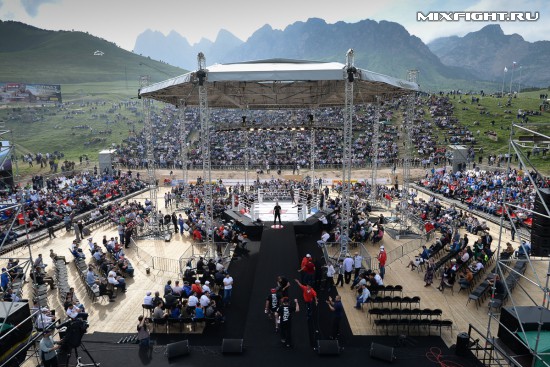
MMA’s popularity on the rise
By 2016, the Yandiyev brothers’ influence had expanded beyond the boundaries of the North Caucasus. Unable to compete due to a back injury, Adam helped establish the Kyrgyzstan MMA Federation in 2016 and is currently in the process of building gyms to promote combat sports in the Central Asian nation. Naturally, this has also presented an opportunity for Yandiyev to mediate newfound ties between Ingush and Kyrgyz fighters, which could lead to more professional opportunities for both groups.
As for Abukar, he plans to continue fighting for the foreseeable future. The 29-year-old became M-1 Global champion back in February — a 67-second victory — and will likely defend the title as the headline act in the promotion’s next event in Ingushetia. His ongoing success is part of the reason why thousands of young Ingush citizens have reportedly joined 16 new fight clubs and gyms.
Yet while president Yevkurov has provided the opportunity and resources that facilitated this change in youth activity, his project should not be above scrutiny. Given Kadyrov’s success in using MMA to enhance his personal image and perpetuate his political propaganda throughout the Chechen Republic, Yevkurov could be accused of similar tactics in masquerading the actual societal and economic issues within Ingushetia.
Instead of building more schools and addressing the increasing economic burden weighing down the citizens who voted for him, Yevkurov opted to instead present the illusion of a safe and tourism-friendly environment by hosting MMA events. It is a testament to the influence of sports on society, and how athletes are often transformed from international representatives to political tools.






